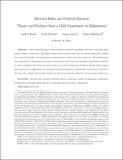Electoral Rules and Political Selection: Theory and Evidence from a Field Experiment in Afghanistan
Author(s)
Beath, Andrew; Christia, Fotini; Egorov, Georgy; Enikolopov, Ruben
DownloadSSRN-id2291187.pdf (549.3Kb)
OPEN_ACCESS_POLICY
Open Access Policy
Creative Commons Attribution-Noncommercial-Share Alike
Terms of use
Metadata
Show full item recordAbstract
Voters commonly face a choice between competent candidates and those with policy preferences similar to their own. This article explores how electoral rules, such as district magnitude, mediate this trade-off and affect the composition of representative bodies and the quality of policy outcomes. We show formally that anticipation of bargaining over policy causes voters in elections with multiple single-member districts to prefer candidates with polarized policy positions over more competent candidates. Results from a unique field experiment in Afghanistan are consistent with these predictions. Specifically, representatives selected by elections with a single multi-member district are better educated and exhibit less extreme policy preferences.
Date issued
2016-07Department
Massachusetts Institute of Technology. Department of Political ScienceJournal
The Review of Economic Studies
Publisher
Oxford University Press (OUP)
Citation
Beath, Andrew, et al. “Electoral Rules and Political Selection: Theory and Evidence from a Field Experiment in Afghanistan.” The Review of Economic Studies, vol. 83, no. 3, July 2016, pp. 932–68. © 2016 The Author
Version: Original manuscript
ISSN
0034-6527
1467-937X